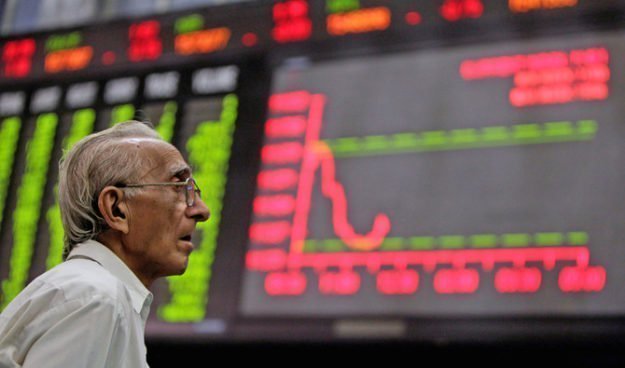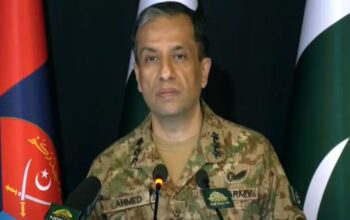By Staff Reporter
KARACHI: Stocks cratered as much as 6 percent at the opening bell after India launched strikes on Pakistan and Azad Kashmir, only to rebound as investors bet against a wider conflict.
The sharp drop followed India’s targeting of six locations inside Pakistan, an assault that military said killed at least 26 civilians, prompting Islamabad to retaliate by striking Indian military posts and downing at least five fighter jets along the disputed Kashmir border.
The benchmark KSE-100 Index shed 6,560 points to 107,007 at the Karachi open, its steepest drop since a 7.3% slide on April 7. At close, the index settled at 110,009.02, with a fall of 3,559.48 points or 3.13%.
The selloff capped a tumultuous period for Pakistan’s equity market, which had soared more than 80% last year on the back of IMF-backed economic reforms. Interest rates halved to 11% since June, and inflation cooled to a record 0.3% in April. But the rally began unraveling after April 22, when an attack killed 26 tourists in Pahalgam, in occupied Kashmir. New Delhi pointed the finger at Islamabad for the assault— a charge Pakistan rejected — sparking the latest flare-up between the nuclear-armed rivals.
Across the border, Indian assets held steadier. The NSE Nifty 50 Index swung between gains and losses after an initial drop of as much as 0.7%. “The new conflict between India and Pakistan is definitely a setback for India’s equity market,” said Homin Lee, senior macro strategist at Lombard Odier Singapore Ltd told Bloomberg. “We will re-assess the outlook if it unexpectedly spirals beyond the usual cycle of tension and diplomacy.”
The question now is whether the skirmish will escalate further. Past conflicts between the two nuclear-armed neighbors have shown that Indian equities tend to recover quickly from an initial knee-jerk reaction. “The tensions will keep markets on tenterhooks in the short term, as the situation remains fluid,” said Sonal Varma, an economist at Nomura Holdings Inc. “That said, past episodes show that the market and economic impact of similar geopolitical events tends to be short-lived.”
In Pakistan, the stakes feel higher. “Pakistan’s past escalations with archrival India had historically presented headwinds for equities,” said Amreen Soorani, head of research at Al Meezan Investment Management.
She noted that while Pakistan’s economy is more vulnerable to prolonged conflict, the nuclear standoff between the neighbors has long acted as a brake on all-out war. “Similar events in the past suggested a pattern of eventual de-escalation, helping restore investor confidence,” she added. “Given prevailing attractive valuations and the anticipated positive impact of IMF developments on investor sentiment, positive sentiments may remain intact in the longer term.”
Stocks began rebounding as traders bet on a cooling of hostilities. “Many believe that after this there will be no major escalation and dust will eventually settle down,” said Mohammed Sohail, chief executive officer of Topline Securities Ltd. Optimism is also pinned on an upcoming IMF board meeting on May 9, where approval of a $1 billion loan tranche could bolster Pakistan’s thinning foreign-exchange reserves.
Emergency Meeting
Amid the turmoil, Finance Minister Muhammad Aurangzeb called an emergency meeting on Wednesday to gauge the financial fallout from “the recent belligerent Indian aggression.”
The huddle included the Governor of the State Bank of Pakistan, the Chairman of the Securities and Exchange Commission, the Secretary Finance, and senior Finance Division officials.
“In a comprehensive and strategic discussion revolving around the situation and functioning of equity, debt, FX and interbank markets, participants conducted a rapid risk assessment and evaluated the current threat perception with an emphasis on ensuring national financial stability and security,” finance ministry said in a statement.
The group reaffirmed the government’s commitment to market stability. “Key assurances were extended to stakeholders, underscoring that robust measures are being implemented to safeguard Pakistan’s economic infrastructure and provide calm, clarity, and confidence to the financial markets,” the statement said. “The participants also emphasised the importance of heightened vigilance against a wide range of threats, with a special focus on cybersecurity and communication infrastructure.”
The meeting reviewed contingency plans, which “have been reinforced to ensure operational resilience and secure communication lines across financial institutions,” the Finance Division noted. “It was also decided that regular reviews of the evolving situation will be held to provide guidance and reassurance to the financial markets and the wider business community.”
Aurangzeb stressed that “Pakistan’s financial system remains stable and secure, and that all relevant authorities are working in close coordination to uphold national economic integrity in the face of emerging challenges,” per the statement.
Copyright © 2021 Independent Pakistan | All rights reserved




